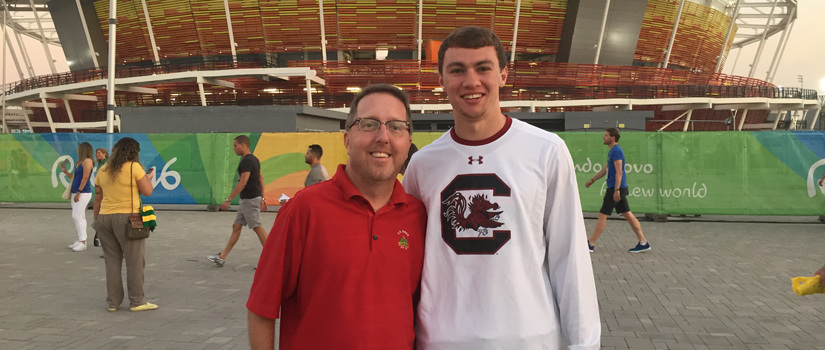Posted on: October 3, 2016
By: Allen Wallace, wallacej7@mailbox.sc.edu, 803-777-5667
An education at the University of South Carolina’s College of Hospitality, Retail and Sport Management always includes time spent outside the classroom, and in many cases time spent learning outside the borders of the United States.
For Sport and Entertainment Management student Anthony Carson, the road to graduation has already included stops at various minor league baseball parks, a summer in Washington, D.C., and a trip to Rio de Janeiro for the 2016 Summer Olympics. He was anything but a tourist on any of the journeys.
"My first experience out of the country was going to the Olympics,” he said. “It was certainly a culture shock for me, but the experience was incredible and being able to tie it in to things through the university certainly made the experience worthwhile."
The trip to Brazil was the culmination of more than a year of work alongside one of his professors, John Grady. Carson and Grady focused their research on the International Olympic Committee’s controversial Rule 40.
Rule 40, in summary, says only Olympic sponsors can make any reference to the Games by using athletes in advertising. As Carson explained, that can be very bad news for an athlete who might, for example, be sponsored by a different soft drink while Coca-Cola is the Olympics’ sponsor.
"These guys train for four years for one week of glory. If they can't make money off themselves in that one week, then it's really hard for them to fund their training,” Carson said. The IOC, hearing concerns from those athletes, agreed to relax the restrictions for the Rio games, and that change became part of the focus for Carson and Grady.
"I think [the IOC] tried their best, but it's a really hard line to walk… If they can't provide a level of exclusivity to those sponsors, there's no point in them paying those premiums,” Carson explained. "Essentially, they tried to allow athletes to be used in generic advertising."
The generic advertising came with conditions, however, most notably a requirement
that any business wanting to run such an ad had to apply for a waiver by March, months
before the Games.
"The issue is if you have to have a campaign in by March to get that waiver, you have
to know that you've already qualified for the Olympics… By the time you qualify, that
waiver deadline has passed," Carson said. "The point was to benefit the lesser-known
athletes that really needed that money… What we found was that relaxing Rule 40, all
it really did was put more money into the pockets of the Michael Phelpses and didn't
really help those athletes needing more exposure."
On the ground in Rio, Carson and Grady also examined “how official sponsors versus non-official sponsors were able to differentiate themselves,” Carson said. "You better believe that everybody's down there, whether they're an official sponsor or not. Nike's the official sponsor, but Under Armour's on the ground."
Carson and Grady found Under Armour displaying a simple way to work around Rule 40 restrictions. The company set up outdoor gyms on beaches near the sites of Olympic events. They contained no references to the games, thus working within the rule, but, as Carson explained, "To the people who live there, the people who pass by, it really looks like that's what they're there for, which is really good ambush marketing."
Carson and Grady worked together to secure funding for the trip through grants including, for Carson, Magellan Scholar student research funding and a South Carolina Honors College research grant. Carson said his professor and mentor has been an invaluable resource. "Dr. Grady is one of the, if not the world expert on Rule 40,” Carson said.
The two did, of course, find time to take in some of the sights and catch some of the events. "The coolest sport we saw, which we didn't expect, was a team handball match,” Carson said. "The city of Rio is beautiful."
Impressive as his Olympic experience was, Carson has not focused solely on it. He served as an intern in minor league baseball in 2015, “not for credit, just to get some experience." Proving the value of networking at every opportunity, he met Ginny Jurgensen, daughter of Washington Redskins’ legend Sonny Jurgensen and the team’s current marketing manager. That led to his decision to apply to serve as Jurgensen’s intern for the Redskins Salute program, the team’s partnership with the military.
"One of the great things about that, and one of the reasons I think she hired me, is that I have some social media experience,” Carson said. Redskins Salute has its own social media accounts, and Carson took charge of them, reshaping the program’s Twitter in particular and increasing its following by 30 percent this summer. "I was able to work with the guys who run the official Redskins accounts... but I was also able to have my own authority on how I ran the Redskins Salute accounts."
Carson also worked closely with Redskins Salute sponsors, and the internship had a significant effect on his future plans. "That kind of also helped me with what transformed into my project for Rio, from the standpoint of looking at sponsorship, because that's really what I studied at the Olympics,” he said. "It kind of pushed me in the direction for my career where I'm looking to do media marketing."
Noting his record of diverse accomplishments while at HRSM, Dr. Grady said that “Anthony took advantage of every opportunity he was offered. He was able to ‘connect the dots’ between what he was learning in class with campus involvement and industry experiences to be uniquely prepared for success in a competitive job market.”
With three semesters remaining in Columbia, Carson still has choices to make, but his experience so far at HRSM has made it clear that for him and his fellow students, the world lies open and full of opportunity.
